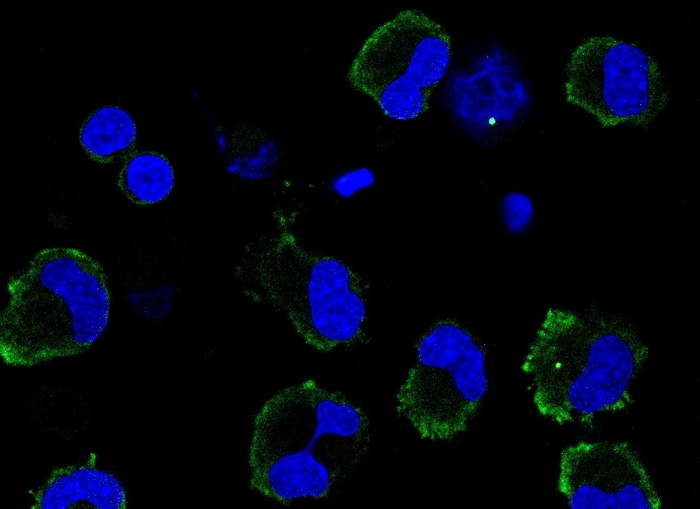Experiments involving animals and human cells conducted at the University of São Paulo (USP) in Brazil suggest that niclosamide, an anthelmintic widely used against tapeworms, effectively inhibits SARS-CoV-2 replication as well as the exacerbated inflammatory response that leads to death in many patients with severe COVID-19.

Credit: Leticia Almeida & Keyla Sá/USP
Experiments involving animals and human cells conducted at the University of São Paulo (USP) in Brazil suggest that niclosamide, an anthelmintic widely used against tapeworms, effectively inhibits SARS-CoV-2 replication as well as the exacerbated inflammatory response that leads to death in many patients with severe COVID-19.
More research is needed to find out whether the effects, described in an article published in Science Advances, are confirmed in patients with the disease, and according to the authors this will require the development of a novel formulation of the drug, as the one currently available from pharmacies is orally administered and would not affect the lungs.
“The commercially available niclosamide pills aren’t absorbed by the stomach and therefore act against intestinal worms. They won’t be any use to combat COVID-19 if taken orally. To surmount this problem, it will be necessary to develop a formulation that delivers the drug directly to the lungs,” said Dario Zamboni, last author of the article.
Zamboni is a professor at the Ribeirão Preto Medical School (FMRP-USP) and affiliated with the Center for Research on Inflammatory Diseases (CRID), a Research, Innovation and Dissemination Center (RIDC) funded by FAPESP. The study was also funded by FAPESP via two other projects (19/11342-6 and 20/04964-8).
According to Zamboni, the anti-inflammatory effects of niclosamide observed in the study were due to inhibition of an immune system mechanism known as the inflammasome, a protein complex present in the interior of defense cells. When this cellular machinery is activated, pro-inflammatory molecules called cytokines are produced to warn the immune system that more defense cells need to be sent to the site of the infection.
Previous research by the FMRP-USP group showed that inflammasomes in severe COVID-19 patients are typically more activated than normal and remain so even after the virus has been eliminated from the organism, causing an exaggerated systemic inflammatory response known as a cytokine storm that injures the lungs and other organs (more at: agencia.fapesp.br/39411/).
Zamboni stressed, however, that niclosamide should not be used prophylactically to prevent exacerbated inflammation. “A little inflammation is important to combat infection by pathogenic microorganisms,” he said. “Exaggerated inflammation is the problem, as is often the case in severe COVID-19. We’re not recommending prophylactic use of the drug, since this could even hinder a recovery by mild or moderate COVID-19 patients.”
Cell cleansing
Niclosamide has been on the market for many years and is mainly prescribed to treat taeniasis (tapeworm infection). It has recently aroused interest among researchers due to claims of potential antiviral action.
According to the authors of the Science Advances article, niclosamide promotes autophagy, a vital process that removes and recycles unwanted or damaged molecules from the body’s cells. When this process of autophagic cell cleansing is induced, old organelles are destroyed, cellular components are recycled and inflammasomes are deactivated. The process also inhibits replication of SARS-CoV-2 inside cells.
The researchers began the study by screening 2,560 compounds, many of which are already used in humans, in a search for substances capable of inflammasome modulation. This involved infecting human defense cells in vitro with Legionella, a bacterium known for inflammasome activation.
After selecting the three most promising drugs, the researchers tested them on mice infected with SARS-CoV-2 and white blood cells from COVID-19 patients. They also tested the effects of these drugs on macrophages and monocytes, front-line immune cells intensely involved in COVID-related inflammasomes. Niclosamide produced the best results.
To investigate its antiviral action, the researchers tested it on monocytes infected in vitro with SARS-CoV-2. “Niclosamide’s antiviral action was already known. Indeed, phase 1 clinical trials involving treatment of COVID-19 patients with the drug are under way right now. Our discovery that it induces autophagy and inhibits inflammasomes offers additional information on the immunomodulatory functions of this highly promising drug,” Zamboni said.
Effects on other diseases
The discovery of an inflammasome-inhibiting drug opens up prospects of novel therapies for other conditions involving inflammation, such as autoimmune and neurodegenerative disorders, flu, some kinds of cancer, and infectious diseases such as zika, chikungunya and Mayaro fever.
“The study focused on COVID-19, but in theory niclosamide should also promote inflammasome inhibition in these other cases. Our results point to numerous other research possibilities,” Zamboni said.
About São Paulo Research Foundation (FAPESP)
The São Paulo Research Foundation (FAPESP) is a public institution with the mission of supporting scientific research in all fields of knowledge by awarding scholarships, fellowships and grants to investigators linked with higher education and research institutions in the State of São Paulo, Brazil. FAPESP is aware that the very best research can only be done by working with the best researchers internationally. Therefore, it has established partnerships with funding agencies, higher education, private companies, and research organizations in other countries known for the quality of their research and has been encouraging scientists funded by its grants to further develop their international collaboration. You can learn more about FAPESP at www.fapesp.br/en and visit FAPESP news agency at www.agencia.fapesp.br/en to keep updated with the latest scientific breakthroughs FAPESP helps achieve through its many programs, awards and research centers. You may also subscribe to FAPESP news agency at http://agencia.fapesp.br/subscribe
Journal
Science Advances
DOI
10.1126/sciadv.abo5400
Article Title
Identification of immunomodulatory drugs that inhibit multiple inflammasomes and impair SARS-CoV-2 infection
Article Publication Date
14-Sep-2022




